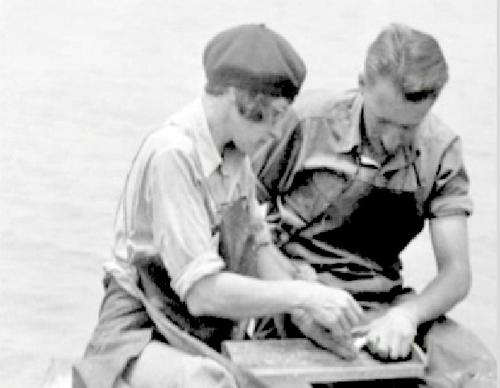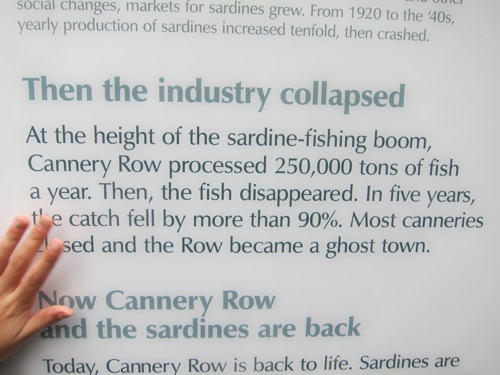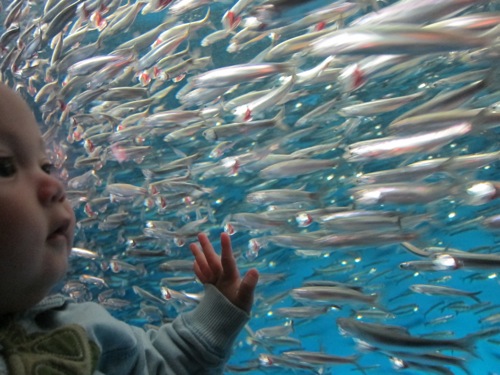The fishing industry in California was built on sardines. While they lasted, they were abundant, easy to catch, and simple to process. They were ground for fish meal, which was used to feed chickens. They were processed for oil. And, during the war, they were an invaluable source of protein for American soldiers fighting in Europe. By the 1930s, according to the J.B. Phillips Historical Fisheries Report, “the Pacific sardine fishery in California was the nation’s largest commercial fishery. And, in the 1936-37 season alone, fisherman had harvested “an incredible 700,000 tons” of the small, oily fish.
Pioneering marine conservationist, Frances Clark, a University of Michigan PhD, was among the first to anticipate a rapid decline in California’s sardine population. Clark, seen here, with her associate John Johnson, recording the deceasing age and size of sardines being caught off the coast of Monterey in 1936, tried to rally support for a reform in fishing practices which would see the species exist into the future, to the benefit of all.
Clark, a respected researcher with the California Department of Fish and Game, knew this exponential growth in the sardine processing industry was untenable. She called for an immediate decrease in sardine fishing, but the industry pushed back… Among other things, they moved a good deal of their operations to floating processing plants three miles off the coast, and thus beyond the jurisdiction of Clark and the state.
By 1937, the situation had become dire. Clark warned, “The future of the California sardine fishery remains in doubt. Present indications are that the demand exceeds supply.” She called for the annual catch to immediately be cut in half. This plea was ignored.
The following comes from the Pacific Fishery History Project.
…(Arthur) McEvoy, in his excellent book, The Fisherman’s Problem
, tells the story of the conflict between state and federal biologists over whether the fluctuations in the sardine catch were a sign that the stock was overfished. The federal biologists sided with the industry and argued the catch was fine. The California Fish and Game biologists, headed by Frances Naomi Clark, argued that too many fish were being taken and the stocks were in danger of collapse…
By 1936 the (floating processing plants) took 250,000 tons, or 32 percent of the entire catch along the Pacific coast. But as labor costs increased and sardines dwindled, Clark reported that by the end of 1938 all floaters had ceased operations off the California coast. At least some of that processing equipment went north to Oregon…
Within five years, the annual sardine catch off the Monterey coast would have dropped by 90%, and Cannery Row would be a ghost town.
It’s hard not to see a parallel with what we’re seeing today relative to global warming, especially as it pertains to corporate responsibility. Then, as now, it would seem that folks attempted to downplay the human role in the disaster.
“Again and again, the California Division of Fish and Game has warned the sardine industry that no fish population can withstand the vast exploitation experienced by the sardine in the last ten years,” said Clark. “The industry is loathe to face this fact, and when any lack of fish arises it marshals all possible explanations which will point the finger of guilt from man.”
Let this be a reminder to everyone out there, as if we needed another, that we cannot allow industry to lead our response to the very real threat of global warming. Corporations are not in the business of sustainability. They’re in the business of extracting value from resources. They consume and move on. And we should never forget that.
update: All of this sardine research of mine was done a year or so ago. As part of our quest to visit every known filming location associated with the American masterpiece Star Trek IV: The Voyage Home, the family and I decided to travel across country and visit the Monterey Bay Aquarium, where, as you may recall, Mr. Spock first communicated with the time traveling whales who would save our planet from what appeared to be an enormous toilet paper tube of doom. While we’d just gone with the intention of sweding a few of our favorite scenes, and then moving on to the intersection of Columbus and Kearny, in San Francisco, where Captain Kirk delivered his brilliant “double dumbass on you” line, we ended up spending the day, watching otters frolic and learning about sardines. (The Monterey Bay Aquarium is located at one end of what was historically a long stretch of sardine canneries known as Cannery Row.)
update: OK, I just couldn’t leave you on that depressing note… So here’s a photo of Arlo at the Monterey Bay Aquarium, looking at sardines. All is not yet lost. There is hope. The sardines are coming back, and there’s a whole new generation of young people who won’t be content to just sit by as people our age continue to kill the planet we need to live.
update: Also, we aren’t really into Star Trek tourism. We went to California to show Alro, who was then still pretty new, to his relatives on the west coast. We actually didn’t figure out the Star Trek IV connection until we’d returned home and started making our way through the Star Trek catalog.















8 Comments
“The industry is loathe to face this fact, and when any lack of fish arises it marshals all possible explanations which will point the finger of guilt from man.”
The global climate change parallels are very clear.
The free market will provide another fish.
The free market gave us zebra mussels and lampreys.
This is a perfect example of how there are situations where a “free market” is not only NOT going to provide the solution but is actively harmful. There are lots of situations like that but don’t tell any libertarians that. It is like telling a Christian that there is no God.
To borrow some “logic” from the climate-change deniers:
I currently have a can of sardines in my pantry, therefore, what’s the problem?
Comment on the JPM/Dimon/Detroit story:
[mark: erase this; use in your post on the subject]
http://www.freep.com/comments/article/20140521/BUSINESS06/305200080/JPMorgan-Chase-Detroit-investment
Bryan Cajamarca · Server at Uptown Tavern
Well, this is the definition of irony…
– JPM Invents derivatives, which were at the core of the 2008 economic destruction;
– They got bailed out with the rest of the banks, who proceeded to foreclose on tens of thousands of Detroit homeowners, who got kicked out of the houses;
– They got a tax writeoff for the 100% writedowns on the loans;
– They abandoned the houses they foreclosed on to the scrappers, taking out entire neighborhoods and leaving bombed out warzones in their wake;
Now JPMC rides in like a white knight with promises of money for home lending and “blight removal” (for the very houses they foreclosed on and abandoned to blight).
How generous of them!
Reply ·
· 36 · May 20 at 9:46pm
It’s about to happen at a macro scale. According to one study, all the world’s fisheries will be completely exhausted by 2050.
http://news.stanford.edu/news/2006/november8/ocean-110806.html
As long as we’re talking about fish, I’d recommend staying away from Vietnamese catfish.
http://www.youtube.com/embed/h1nEPzsFpc0